
Lit Hub’s Most Anticipated Books of 2022
196 Books We're Looking Forward to This Year
APRIL
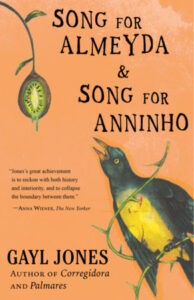
Gayl Jones, Song for Almeyda and Song for Anninho
Beacon, April 5
This year has seen renewed interest in Gayl Jones, whose novels were first published in the mid-1970s to critical acclaim. Toni Morrison was an advocate of Jones and praised the manuscript of 1975’s Corregidora: “No novel about any black woman could ever be the same after this.” Yet Jones disappeared from the public eye in 1998—why? Perhaps that answer is not as important as why Jones’s work is considered a touchstone of Black American literature. This volume of poetry, set in the late 17th century, revisits the characters introduced in Palmares—Almeyda and Anninho. This decolonial love story in verse adds to the impressive oeuvre of Jones. –VW

Jennifer Egan, The Candy House
Scribner, April 5
Fans of A Visit to the Goon Squad (me) will not be disappointed by this “sibling novel,” in which Egan returns to the structure (interconnected but discrete sections in an impressive variety of styles—tweets instead of PowerPoint this time) and some of the characters of her Pulitzer Prize winning 2011 novel. In fact, she justifies her form even further here—many of the sections touch on the consequences of a new tech innovation, “Own Your Unconscious,” which allows users (i.e. everyone) to export their experiences and then (of course) upload them to the cloud for all to share. But more interesting—and this, really, is Egan’s point—is the humanity of this novel, the way in our lives, too, are interconnected but discrete, and how they fit together. It is very good. –ET

Ludwig Wittgenstein, tr. Marjorie Perloff, Private Notebooks
Liveright, April 5
Initially written in code during WWI and translated for the first time in English by Perloff, Wittgenstein notebooks contextualize the early years of his Tractatus-Logico-Philosophicus. Starting with the summer of 1914, when Wittgenstein finds himself a soldier in the Austrian army, the notebooks consider his sexuality and explore the formations of analytical philosophy, as they pertain to the looming instances and potential of death of the early 20th century. –SK
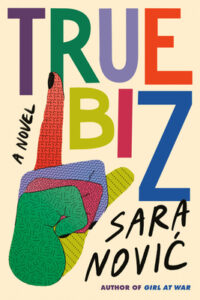
Sara Nović, True Biz
Random House, April 5
“True biz” is an exclamation in American Sign Language: really, seriously, definitely, real-talk. Novic’s second novel is a coming of age story set at the River Valley School for the Deaf, where students Austen and Charlie, and CODA (child of deaf adults) headmistress February learn to navigate their place in the world. With a television adaptation optioned, this is an incredible story of sign language, disability rights, first love, and loss. –EF
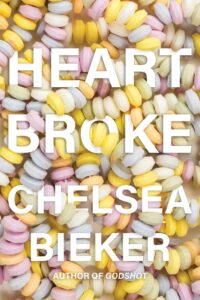
Chelsea Bieker, Heartbroke: Stories
Catapult, April 5
If you haven’t yet read Chelsea Bieker’s Godshot, you have a few months to do so before her debut story collection hits. If you have read her cult classic (wink wink), and you’re still thinking about it, you’re in luck. The characters you will encounter in Heartbroke are sure to be just as unforgettable. Set against the backdrop of sunny California, in these stories, you will encounter: teenagers flirting with danger, an entrepreneurial mother–son duo, a phone sex operator, a very sad kidnapper. Chelsea Bieker is back, baby! –KY

Emily St. John Mandel, Sea of Tranquility
Knopf, April 5
Readers of Mandel’s Station Eleven and The Glass Hotel will not be disappointed by her latest, a generous and elegant novel about art and family and time travel—in fact, they will be particularly rewarded by the way the three texts intersect. I won’t say more about that, except to note that it was a strange experience, reading this book in a pandemic—certain passages made me shudder, but others gave me solace. After all, no matter what happens, time, at least as Mandel sees it, will go on. –ET
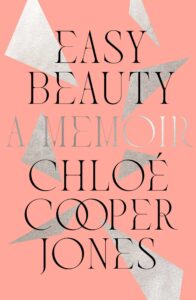
Chloé Cooper Jones, Easy Beauty
Avid Reader Press, April 5
This memoir about disability and motherhood spans the globe – from “life in Brooklyn to sculpture gardens in Rome; from film festivals in Utah to a Beyoncé concert in Milan; from a tennis tournament in California to the Killing Fields of Phnom Penh.” Cooper Jones challenges the unspoken social taboos about the disabled body, unpacking myths of beauty and our complicity in upholding those myths. Blending journalism, philosophy, and memoir, it’s a book that everyone will be talking about this Spring. –EF
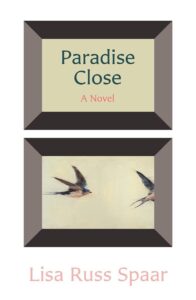
Lisa Russ Spaar, Paradise Close
Persea, April 5
It seems like all of of my favorite novelists are also poets, and so as an enormous fan of Lisa Russ Spaar’s lush, ecstatic poetry, I can’t wait to read her first (!) novel, a book about outcasts and exiles that Eleanor Henderson described as “a soulful, sexy, extraordinarily lyrical meditation on things that matter―art, aging, love, desire, the body, and the brief, passionate encounters that bind us to each other and sometimes save our lives.” Perfect, I suspect, for reading in the garden this season. –ET
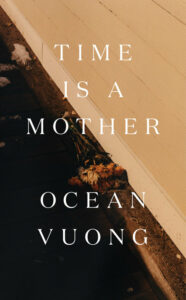
Ocean Vuong, Time Is a Mother
Penguin Press, April 5
When Night Sky With Exit Wounds came out over five years ago, it was a revelation. When On Earth We’re Briefly Gorgeous hit shelves two years after that, it was every bit as breathtaking. All of Ocean Vuong’s writing shows a masterful attention to detail. He comes at language with a magnifying glass. He holds words differently than everyone else, and when he hands them to you, they are changed. Now Ocean Vuong returns to poetry with his second collection. Dealing with the death of his mother, this new book comes from a place of grief and memory, turning loss over and over in a way that only this writer can. You’ll want to read this latest addition to his oeuvre immediately. –KY
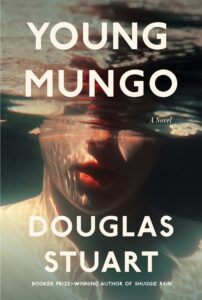
Douglas Stuart, Young Mungo
Grove, April 5
Booker-prize winner Douglas Stuart’s second novel is another a vivid story of working-class Glaswegian life. The emotional and suspenseful story follows two young men, Mungo and James, as they fall in love against all odds, amidst hypermasculinity, violence, and sectarianism. Stuart’s debut, Shuggie Bain, was universally loved; a heart-wrenching story of a young boy and his alcoholic mother. Young Mungo promises to be as unforgettable and powerful, revealing the violence faced by many queer people, and the dangers of loving someone too much. –EF
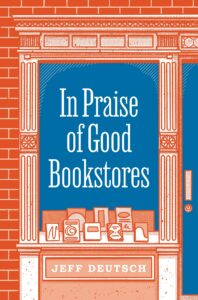
Jeff Deutsch, In Praise of Good Bookstores
Princeton University Press, April 5
As though it hadn’t already hooked you from the title, In Praise of Good Bookstores is also written by Jeff Deutsch, director of the well-beloved Seminary Co-op Bookstores in Chicago—the first not-for-profit bookstore in the US and one renowned for its unique collection of academic titles. Deutsch ties his love of bookstores, reading, and knowledge to Jewish traditions of education and reflection, which also resonates with the rich literary tradition that Jewish writers developed in Chicago during the early and mid-20th century. If you’re still reading this blurb, by far the nerdiest one I’ve ever written, then we should both read this book. –CS
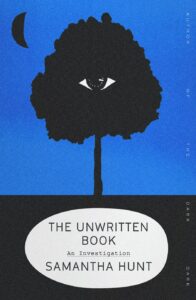
Samantha Hunt, The Unwritten Book: An Investigation
FSG, April 5
The Dark Dark pushed the boundaries of what one could do with short fiction, so I’m particularly excited to check out Samantha Hunt’s first foray into nonfiction. Well, a “genre-bending work of nonfiction,” but we should expect nothing less. In The Unwritten Book, books = ghosts. Reading is a way of talking to the dead. Remembering stories is a way of being haunted by them. Fuelled by the discovery of her father’s unfinished manuscript, Samantha Hunt is on the hunt (sorry) for clues about all that is left unsaid. Part literary criticism, part memoir, part family history, this new book explores the things that have a hold on us. I, for one, am ready to be haunted by Samantha Hunt once again. –KY
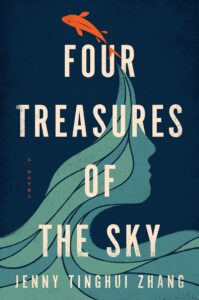
Jenny Tinghui Zhang, Four Treasures of the Sky
Flatiron, April 5
In Zhang’s debut novel, set in the American West of the 1880s but shot through with Chinese folklore and calligraphic references, a 13-year-old girl is kidnapped from a Chinese market and brought to San Francisco. Under the shadow of the Chinese Exclusion Act, she makes her way to Idaho, passing as a boy to survive, but hoping, despite everything, to do more than that. –ET
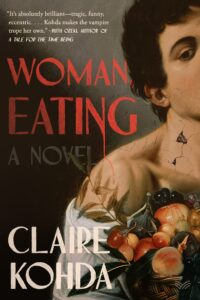
Claire Kohda, Woman, Eating
HarperVia, April 12
You might think the time for vampire novels has come and gone, but you clearly wouldn’t be imagining this one. Woman, Eating is about the every-girl: Lydia scrolls on Instagram, loves Buffy the Vampire Slayer, likes to paint, misses her mom, has a crush on a cute boy—and she’s hungry. Boy, is she hungry. But even though the food she craves is the food we crave: sushi, ramen, ice cream, cake, the only food she can ingest is blood. Why? Because she’s a vampire, of course, just not your typical version. Lydia is overwhelmed with the same thoughts that plague the normal human—about identity, her father’s race and culture and what it means for her, how to be, how to live—and yet to top it all off she has to deal with the whole question of eating. Can she have it both ways? –JH
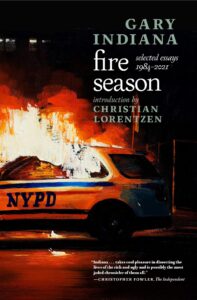
Gary Indiana, Fire Season: Selected Essays, 1984-2021
Seven Stories Press, April 12
Even if you don’t agree with him, the iconic Gary Indiana is always worth your time. This collection of his essays contains, as the publisher puts it “sometimes bitchy, always generous, erudite, and joyful assessments from the last thirty-five years of cutting-edge film, art, and literature.” Sounds about right. –ET
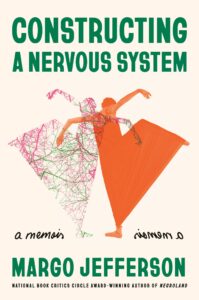
Margo Jefferson, Constructing a Nervous System
Pantheon, April 12
Jefferson (Negroland) excavates inner truths in this memoir about pivotal life moments. Using the structure of a nervous system as a framework, Jefferson approaches the subject of physicality as a state of wonderment. The book’s approach to storytelling is surprising and refreshing, allowing Jefferson to experiment with literary convention. Our identities are often comprised of our responses to the world around us; art and other forms of creative expression can serve as blueprints for transcendence. I look forward to seeing how Jefferson is able to unify—or rather fuse divergent fragments—into a body of kinetic energy. –VW
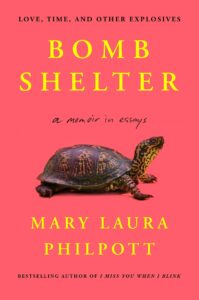
Mary Laura Philpott, Bomb Shelter: Love, Time, and Other Explosives
Atria, April 12
“If this happened, what else could?” The thought first arrives when historically sunny, glass-half-full Philpott finds her teenage son unconscious in his room. This world-shaking event forces Philpott to reorganize everything, including her own thoughts and her relationship to faith. In this memoir in essays, “If this happened, what else could?” becomes a refrain. But ultimately, Bomb Shelter serves as a kind of balm: While recognizing the unpredictable, the random, unstoppable forces of life, Philpott gently guides the reader with humor and familiarity through life’s terrain, letting her readers know if she can do it, we can do it. –JH
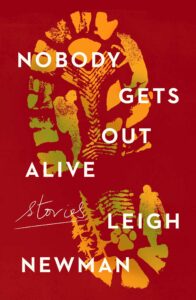
Leigh Newman, Nobody Gets Out Alive: Stories
Scribner, April 12
In these stories, all set in Newman’s home state of Alaska, women seek survival, connection, home and safety, their quests tinged with the wildness of the state, the unknowability of the landscape, as well as the male-dominated culture that’s prevailed there for decades. The tales span the last century, some taking place in the Last Frontier, some in the early years of the 20th century; all are stunningly crafted, and make it impossible to think of moving on to the next story and leaving behind the character in question, until you do, and find that each is better than the last. –JH

Tajja Isen, Some of My Best Friends
Atria/One Signal, April 19
Catapult editor Tajja Isen is ready to call everyone on their bullshit. If liberal industries can call out institutionalized racism, why can’t we actually change it? Blending inviting personal essay with biting cultural critique, Some of My Best Friends takes readers to the uncomfortable space between what Nice White People intend and the inaction rooted in our society. These essays explore the problems of representation in Hollywood, the blinding whiteness of the literary industry, and band-aids companies attempt to stick to the wound. It’s time to rip the band-aid off. It’s time to read Tajja Isen and dare to dream of a better place. –KY
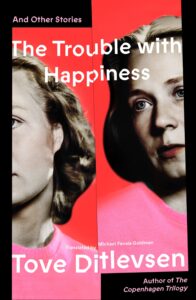
Tove Ditlevsen, tr. Michael Favala Goldman, The Trouble with Happiness: And Other Stories
FSG, April 19
Last year’s best book of the year (according to The New York Times and me) was Tove Ditlevsen’s Copenhagen Trilogy. Now her short stories are available for the first time in English. These “poignant and understated stories” have the same pared down voice and incredible authority of the memoir (and, according to her translator, these stories sometimes mine her own life for material, with some stories appearing “to be extrapolations of scenes that are mentioned only briefly in her memoirs.”) You can read one of the stories, “The Umbrella,” that was published in The New Yorker, and grab the rest in April! –EF
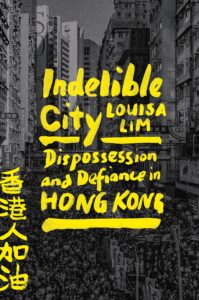
Louisa Lim, Indelible City: Dispossession and Defiance in Hong Kong
Riverhead, April 19
Lim’s book, covering the key moments in Hong Kong’s history—from the 1842 British colonization to the 1997 British-Chinese negotiations—centers Hong Kong in its own narrative, highlighting guerilla calligraphers, amateur historians, and street artists who make up the place. At the heart of it is the King of Kowloon, the street artist whose work shapes and is shaped by the larger identity of Hong Kong, from being unseen to seen, unheard to heard. –SK
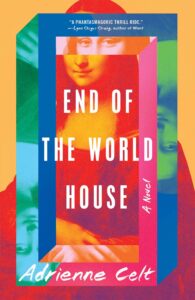
Adrienne Celt, End of the World House
Simon & Schuster, April 19
Best friends go to Paris at the end of the world—which sounds good to me already, but then you discover that the end of the world turns out to be resisting itself . . . by means of a time loop. I suppose you could be in worse places for eternity than the Louvre, but I’ll still be reading to find out what happens. –ET
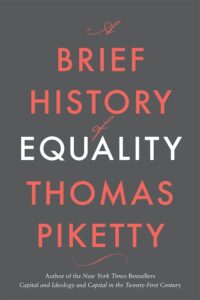
Thomas Piketty, A Brief History of Equality
Belknap Press, April 19
I am sure much smarter people than me are poised to consider this book—which is, as the title suggests, a précis of Piketty’s full body of work around the subject of equality, and its evil twin, inequality—in conversation with David Wengrow and the late David Graeber’s riotously fun The Dawn of Everything. Though they arrive at it through different means and modes of scholarship, Piketty and the Davids seem to come to the same conclusion: “Guys, wtf, it doesn’t actually have to be like this.” To which I say, YES. –JD
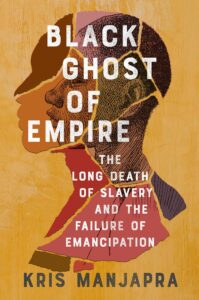
Kris Manjapra, Black Ghost of Empire: The Long Death of Slavery and the Failure of Emancipation
Scribner, April 19
Manjapra’s book traces the unfinished work and process of emancipation in the Atlantic world. Highlighting the movements that began in the 1770s and and ended in the 1880s, Manjapra examines the Gradual Emancipations of North America, the Revolutionary Emancipation of Haiti, the Compensated Emancipations of European overseas empires, the War Emancipation of the American South, and the Conquest Emancipations of sub-Saharan Africa, in order to investigate the ways in which such abolition processes ultimately sanctioned violence against Black communities and affirmed white supremacy. In the context of these unfinished processes, Manjapra considers the ways in which grassroots Black activists have become the stewards of care and recovery, for both the past and the present. –SK
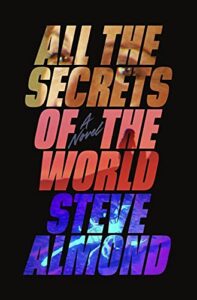
Steve Almond, All the Secrets of the World
Zando, April 19
I still remember reading “Donkey Greedy, Donkey Gets Punched” in the Best American Short Stories 2010 as a child, and being stunned by its use of graphics (now, I’d be stunned by other elements). Now, over a decade and many short stories (and nonfiction works) later, Steve Almond is finally releasing his debut novel. In it, two girls are paired together for the science fair, setting off a chain reaction that sends one of them through the desert and into the criminal justice system. Zando says the book is Little Fires Everywhere meets Breaking Bad—that can’t be boring. –WC
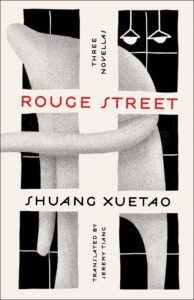
Shuang Xuetao, tr. Jeremy Tiang, Rouge Street: Three Novellas
Metropolitan Books, April 19
This collection of three novellas moves readers from an inventor of dreams to a criminal stuck under a frozen lake to a strange, strange girl. Set in Shenyang, a post-industrial city in the northeast of China, Xuetao’s novellas are as beautifully frigid and gritty as the city he writes about, as he inspects the dust left following an economic boom, and the things that percolate in spite of lost and unfulfilled promise. –SK
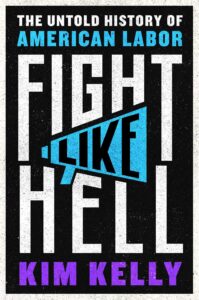
Kim Kelly, Fight Like Hell: The Untold History of American Labor
Atria/One Signal Publishers, April 26
I first became aware of Kim Kelly due to her excellent reportage as a labor columnist for Teen Vogue. In Fight Like Hell, Kelly promises the same type of hard-hitting, nuanced coverage we’ve become accustomed to. Kelly’s coverage of the history of the American labor movement doesn’t rely on the whitewashed, oft-repeated narratives that populate the pages of school textbooks. –VW
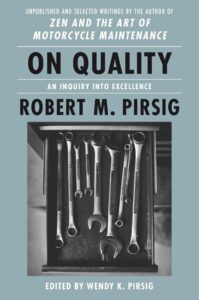
Robert M. Pirsig, ed. Wendy K. Pirsig, On Quality: An Inquiry into Excellence: Unpublished and Selected Writings
Custom House, April 26
Attention all Zen and the Art of Motorcycle Maintenance acolytes (or ex-acolytes): the unpublished writings of Robert M. Pirsig, who died in 2017, will soon be available for public consumption, thanks to the efforts of Wendy K. Pirsig, the author’s wife of 40 years, who edits and introduces the collection. Will 2022 be the year that MOQ comes back? Only time will tell. –ET
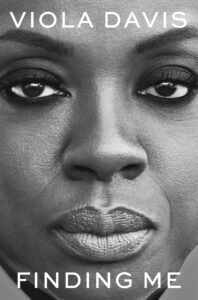
Viola Davis, Finding Me
HarperOne, April 26
From How to Get Away with Murder to Ma Rainey’s Black Bottom, you’ve seen Viola Davis. You know Viola Davis. But do you really? One of six children, daughter to an alcoholic/horse trainer and a factory worker/civil rights activist, Viola Davis grew up in poverty in South Carolina and Rhode Island. Finding Me takes us from the hardships of those early days to the possibilities of stage. When asked by Oprah Daily what inspired her to write this book, she said, “It’s my way of helping people feel less alone in a world that’s so isolating.” What better reason than that? –KY
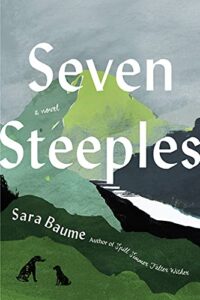
Sara Baume, Seven Steeples
Mariner Books, April 26
The second book from the author of Spill Simmer Falter Wither is a lyrical meditation on nature and companionship, following two people who give up on their disappointing, conventional lives, and retreat from everything, disappearing into the Irish countryside. As the kids say: goals. –ET
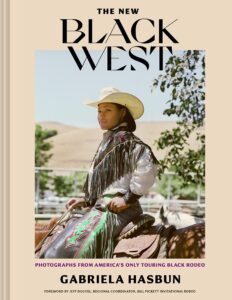
Gabriela Hasbun, The New Black West: Photographs from America’s Only Touring Black Rodeo
Chronicle Books, April 26
For years photographer Gabriela Hasbun has been documenting the annual Bill Pickett Invitational Rodeo in the hills outside Oakland, which brings together a community of Black cowboys whose very existence flies in the face of America’s old myths of the West. Hasbun’s beautiful photographs of contemporary Black rodeo riders—and their families, their celebrations—honor a rich legacy too often ignored by the wider world. –JD












